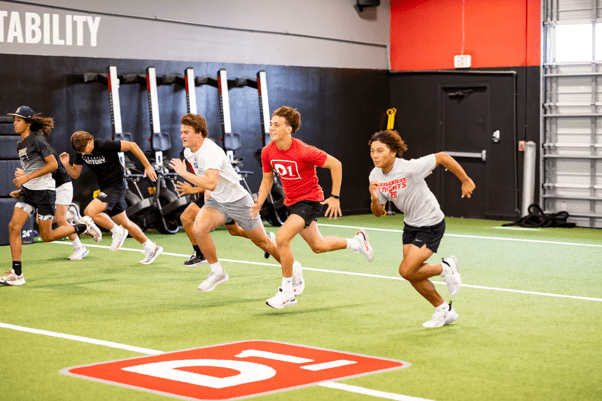Why are Tryouts So Scary + How to Overcome the Nerves
Author: D1 Training
With youth sports coming up in the Fall, many young athletes find themselves preparing for tryouts. It’s a big day! Hours of practice and training culminate into one shot at making the team, so there are a lot of nerves in the air. If you’re the parent of a young athlete, you’re very familiar with seeing this stress. You can read it on their face both in the car and on the sideline. A little stress might drive an athlete to do their best but too much of it can be a problem.
Kids' fitness and athletics are important for a variety of reasons. Sports can teach kids things like discipline, competitiveness, and personal health. Sports can give kids their highest highs and their lowest lows. So where does the stress come from?
Besides having overall negative feelings, stress and nervousness can seriously impact the performance of an athlete on their big day. There are many factors contributing to nerves in youth sport tryouts, and we’re here to help you navigate them.
Causes of Stress for Young Athletes
Sports are built on the pillar of competition. In team sports, before a player can compete against the local rivals, they must first compete among their peers. This is where tryouts enter the conversation. For a lot of young athletes, the result of their tryout is reflective of more than just their athletic ability. It can influence their self-perception, or even their position in social circles. Athletic tryouts force kids to compare themselves to one another. It’s this added social pressure that can make tryouts more stressful.
Next, it’s very natural for an athlete to deal with high expectations, whether from themselves, coaches, parents, or especially, their teammates. The expectation to do well can be enough to interfere with an athlete's ability to perform. A core aspect of playing on a team is the idea of playing for your team. If a kid has a bad game, they might feel that they let their team down. They might feel they let their coach down. This pressure to perform well is more than enough to provide stress to an athlete.
Immediate Relief: Breathing
So how do we combat performance nerves on the big day? The most important thing an athlete can do is breathe. Deep, controlled breathing will be their best friend before it’s time to compete. Deep breathing reduces their heart rate, transfers more oxygen to their blood, and helps them focus. Calming down is the first step to overcoming stress. Here’s a proven method of deep breathing to calm nerves. Some call it Box Breathing, and it can be done anywhere at any time (without anyone knowing!), even on the sideline just before taking the field.
- Breathe in for 5 slow seconds
- Hold for 5 slow seconds
- Release for 5 slow seconds.
- Hold for 5 slow seconds
- Repeat 3-4 times until calm
It is possible, however, to help get a grip on those nerves before they rear their ugly head.
Preventative Measures
For one: Practice! Practice will always beat talent when talent doesn’t practice. It’s all about building self-confidence so that on the day of the tryout, they simply do what they’ve been doing all along. Build up the reps, put in the prep, and tryouts won’t feel so intimidating.
Next, as important as practice is strength and conditioning training. An athlete’s body is like a warrior’s weapon, they’ve got to keep it sharpened. Frequent strength and cardio training in the weeks leading up to a tryout will do nothing but make getting the job done on tryout day that much easier.
Finally, a combination of frequent practice and conditioning will also create a third weapon against stress: mental fortitude. With every rep repeated, every mile traversed, mentally, an athlete is realizing their own ability. The power of knowing their capabilities only serves to bolster their confidence and reinforce what they already know. I am meant to be here. When an athlete’s brain begins to connect those dots, it can turn tryout day into something to look forward to and not stress over.
In summary, nerves are natural, especially in sports. There will be plenty of times in an athlete’s career where they will feel the weight of the world on their shoulders. The mental pressure will show itself in the most crucial moments, and at times, seem debilitating. Whether it’s the fear of being rejected, the fear of their peer’s perception, or the fear of failure, the pressure remains.
Remind your student athlete that it is possible to train to beat that pressure.
Lock in and breathe. Remind them how hard they’ve trained to get to where they are.
Training strengthens the body and mind. The best thing an athlete can realize is that their mental strength, their mind-over-matter, their stress level, is not a hindrance. It’s just another muscle to build.
